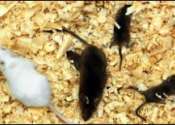Aggression causes new nerve cells to be generated in the brain
A group of neurobiologists from Russia and the USA, including Dmitry Smagin, Tatyana Michurina, and Grigori Enikolopov from Moscow Institute of Physics and Technology (MIPT), have proven experimentally that aggression has ...
Feb 5, 2016
0
839








